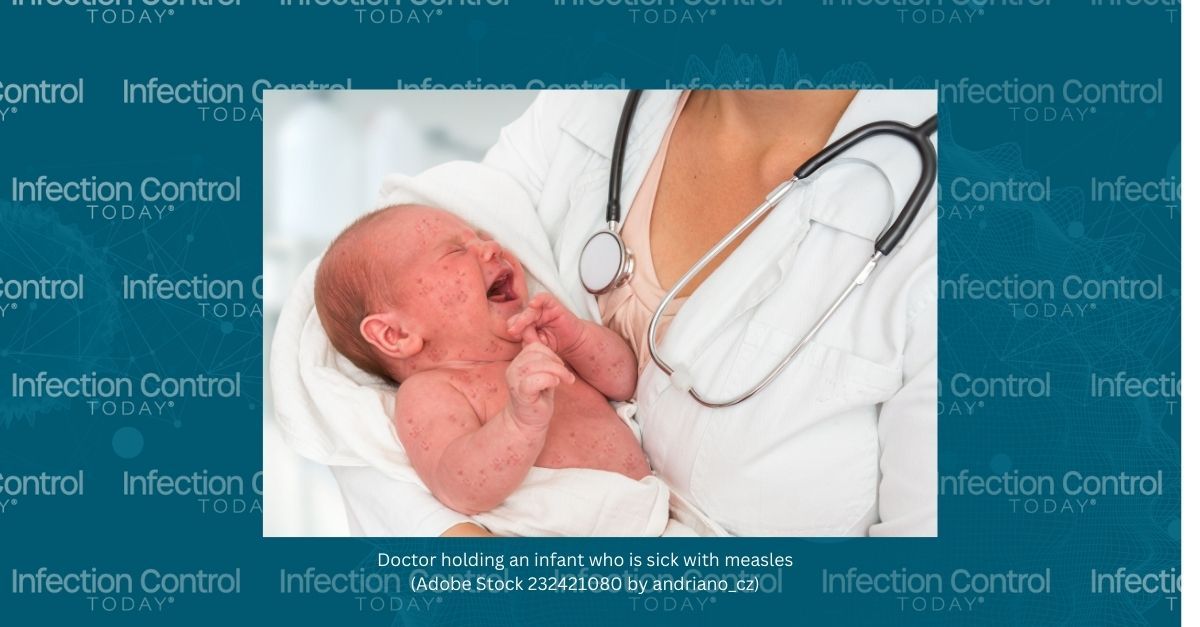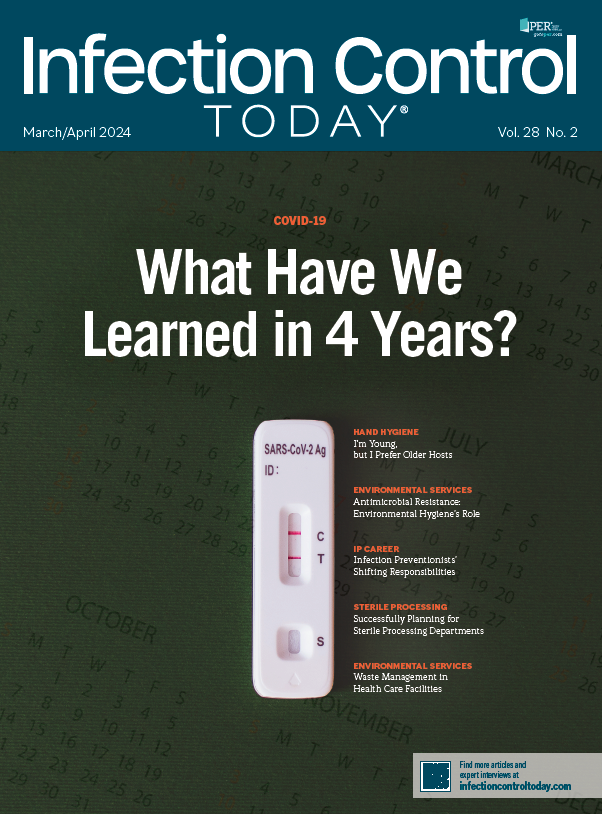More Measles Cases Confirmed in New Orleans, Ohio, Minnesota, and More
Despite the severity of a measles diagnosis, outbreaks continue. Health care workers should encourage their patients to receive the vaccine and explain its safety.
Doctor is holding an infant who is sick with measles.
(Adobe Stock 232421080 by andriano_cz)

The Louisiana Department of Health recently announced a concerning development: 2 confirmed cases of measles in the greater New Orleans area. This revelation has sparked an urgent investigation, especially given that the affected patients had recently traveled out of state.
These cases mark the first instances of measles in Louisiana since 2018.The infections involve 2 children who are currently receiving treatment at Children's Hospital New Orleans, according to reports from The New Orleans Times-Picayune.
There has been a worrying trend recently, with several other states, including Florida, Arizona, Minnesota, Ohio, Georgia, and Maryland, reporting cases of measles as well. This rise in domestic infections is consistent with a global increase in measles occurrences, highlighting the gaps in vaccination coverage.
"A lot of the states now are seeing new vaccination rates in the children in the high 60s, which means that we've got an awful lot of susceptible kids that are out there," said USF Health Dr. Thomas Unnasch. "You're actually starting to see the effects of the anti-vax movement and the fact that a lot of our children are no longer getting vaccinated for measles."
The fight against measles misinformation has been continuing for some time, and the guidance hasn’t changed. “Measles is preventable, and the way to end this outbreak is to ensure that all children and adults who can get vaccinated do get vaccinated. Again, I want to reassure parents that vaccines are safe and do not cause autism. The greater danger is the disease that vaccination prevents,” said previous CDC director Robert Redfield, MD, in 2019. “Your decision to vaccinate will protect your family’s health and your community’s well-being. CDC will continue working with public health responders across our nation to bring this outbreak to an end.”
The situation is further complicated by new cases being reported in states that have already been affected by measles outbreaks. For instance, in Arizona, the Maricopa Department of Public Health has confirmed 2 new cases, bringing the state's total to 3. These cases are linked to earlier reported exposures, leading health officials to issue warnings about potential exposures at various locations in the Chandler area, including restaurants, a car rental office, and an auto body shop.
With the announcement of the measles cases in Florida, The Florida Department of Health emphasized how contagious the virus is. Still, Florida Surgeon General Joseph Ladapo, MD, PhD, known to not trust the COVID-19 vaccines, stopped short of urging parents to vaccinate their children for measles.
Other countries are having outbreaks as well: Yemen with 18,464, India with 12,301, and Ethiopia with more than 10,060. According to the CDC, “Although measles was declared eliminated in the United States in 2000, almost 1,300 cases of measles were reported in 31 states in the U.S. in 2019— the greatest number since 1992. The 2019 US measles outbreaks were all linked to travel-related cases that reached at-risk populations (un or under-vaccinated against measles) in the United States.”

Newsletter
Stay prepared and protected with Infection Control Today's newsletter, delivering essential updates, best practices, and expert insights for infection preventionists.
Reducing Hidden Risks: Why Sharps Injuries Still Go Unreported
July 18th 2025Despite being a well-known occupational hazard, sharps injuries continue to occur in health care facilities and are often underreported, underestimated, and inadequately addressed. A recent interview with sharps safety advocate Amanda Heitman, BSN, RN, CNOR, a perioperative educational consultant, reveals why change is overdue and what new tools and guidance can help.
New Study Explores Oral Vancomycin to Prevent C difficile Recurrence, But Questions Remain
July 17th 2025A new clinical trial explores the use of low-dose oral vancomycin to prevent Clostridioides difficile recurrence in high-risk patients taking antibiotics. While the data suggest a possible benefit, the findings stop short of statistical significance and raise red flags about vancomycin-resistant Enterococcus (VRE), underscoring the delicate balance between prevention and antimicrobial stewardship.
What Lies Beneath: Why Borescopes Are Essential for Verifying Surgical Instrument Cleanliness
July 16th 2025Despite their smooth, polished exteriors, surgical instruments often harbor dangerous contaminants deep inside their lumens. At the HSPA25 and APIC25 conferences, Cori L. Ofstead, MSPH, and her colleagues revealed why borescopes are an indispensable tool for sterile processing teams, offering the only reliable way to verify internal cleanliness and improve sterile processing effectiveness to prevent patient harm.
The Next Frontier in Infection Control: AI-Driven Operating Rooms
Published: July 15th 2025 | Updated: July 15th 2025Discover how AI-powered sensors, smart surveillance, and advanced analytics are revolutionizing infection prevention in the OR. Herman DeBoard, PhD, discusses how these technologies safeguard sterile fields, reduce SSIs, and help hospitals balance operational efficiency with patient safety.
Targeting Uncertainty: Why Pregnancy May Be the Best Time to Build Vaccine Confidence
July 15th 2025New national survey data reveal high uncertainty among pregnant individuals—especially first-time parents—about vaccinating their future children, underscoring the value of proactive engagement to strengthen infection prevention.